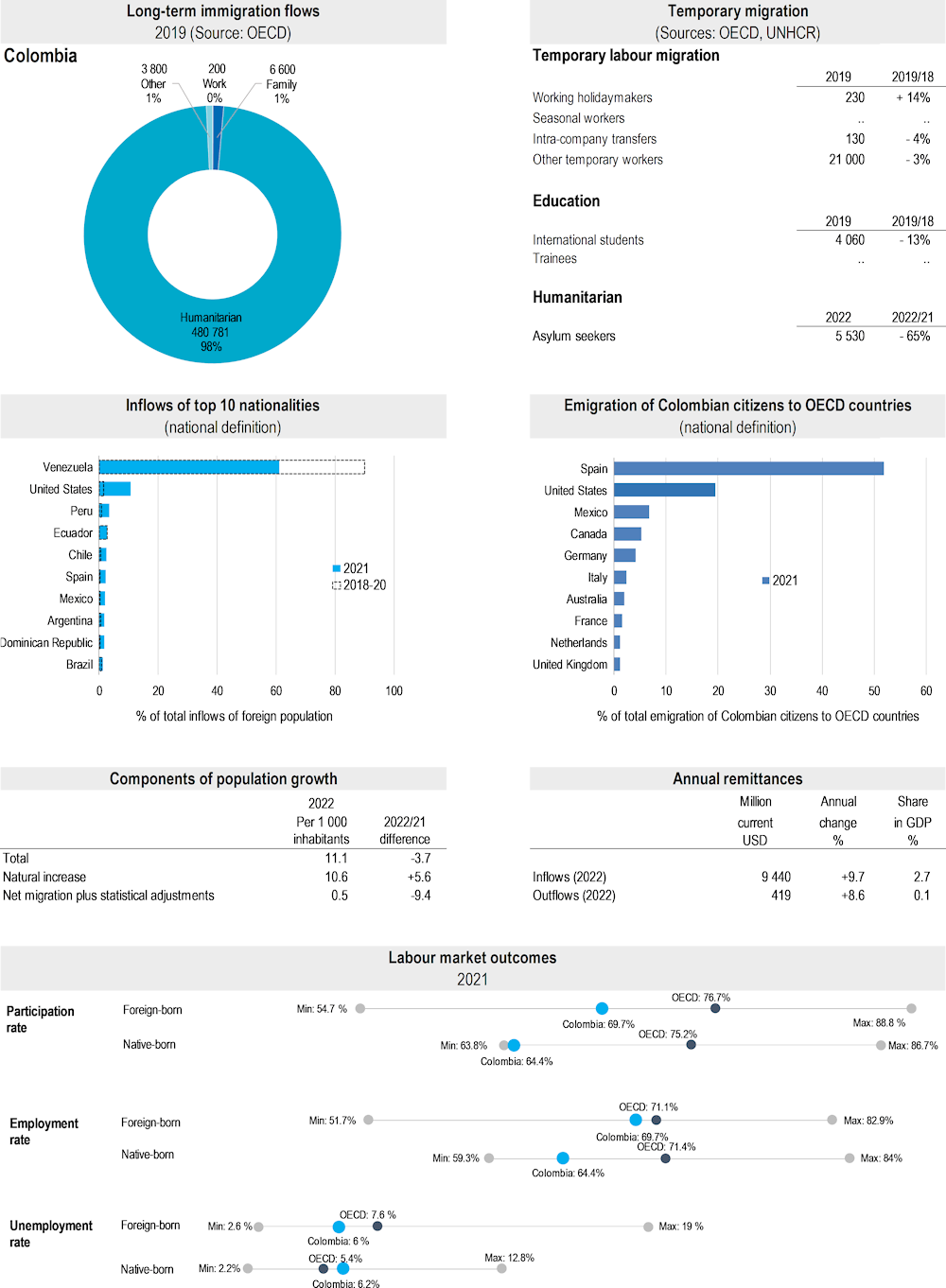Venezuela, the United States and Peru were the top three nationalities of newcomers in 2021. Among the top 15 countries of origin, the United States registered the strongest increase (+2 700) and Venezuela the largest decrease (‑39 000) in flows to Colombia compared to the previous year.
In 2022, the number of first asylum applicants decreased by ‑65%, to reach around 5 500. The majority of applicants came from Venezuela (5 200), Cuba (200) and Ukraine (28). The largest increase since 2021 concerned nationals of Cuba (+100) and the largest decrease nationals of Venezuela (‑11 000). Of the 12 000 decisions taken in 2022, 1% were positive.
Emigration of Colombian citizens to OECD countries decreased by ‑18% in 2021, to 77 000. Approximately 52% of this group migrated to Spain, 20% to the United States and 7% to Mexico.
In July 2022, Colombia’s Economic and Social Policy Council published CONPES 4 100, a ten‑year strategy for the integration of Venezuelan migrants. The framework consists of seven action lines aiming to secure access to public services and the labour market, foster their social and cultural integration, and enhance the capacity of immigration policy institutions. The CONPES also sets data and evidence collection as a key to the success of migration policy.
The Temporary Protection Status (TPS) remains the main protection and regularisation instrument for Venezuelan migrants in Colombia. It grants them legal status to stay in the country and possibly apply for a permanent resident visa after ten years. The TPS was hailed by the international community and set a historic precedent in the region.
Since 2021, however, migrants have faced increasing challenges in obtaining a physical ID, called Permission for Temporary Protection (PPT). In 2023, the Colombian Government has issued new measures to extend protection to those in an irregular situation. In January 2023, the migration authority (Migración Colombia) developed a new temporary identification document/certificate for those applying for a PPT. The document allows migrants to gain immediate access to public services and temporarily enter and leave the country while awaiting the issue of a PPT. In April, the expiration date to acquire the new certificate was extended to the end of 2023.
Migración Colombia also launched the programme “You Are Still in Time” [Aún estás a tiempo] in March this year. The objective is to provide Venezuelan nationals who have been unable to secure the PPT with four alternatives, including: a) To Validate, the mechanism to confirm that the person is still interested in continuing the PPT process; b) To Download, the modality for those who have already started the application process for a PPT to download the temporary certificate; c) To Pick up, a strategy seeking to deliver more than 100 000 PPTs that Venezuelan nationals have not claimed; and d) To Register, an alternative aimed at Venezuelan migrants who hold the PEP or a Refugee Status declined and have not completed the PPT process (valid until 30 May 2023).
In April 2023, the Colombian Congress began discussing a bill to recognise climate‑induced displacement, the first of its kind in Latin America. Adopting a broad definition of climate‑displaced people, it seeks to prioritise access to housing, health services, and education and establish a national register. One month later, the bill received approval in the first of four rounds of discussion required to pass.
With the end of Title 42 in the United States, the Biden Administration announced that it would enable 100 regional migration hubs across the Western Hemisphere; currently, the Colombian authorities are in negotiations for the initiative and a proper operation.
Finally, Migración Colombia is implementing a strategy called “PPT in one day” The process allows for deliver the ID on the same day when the person enrols.
For further information: www.migracioncolombia.gov.co

